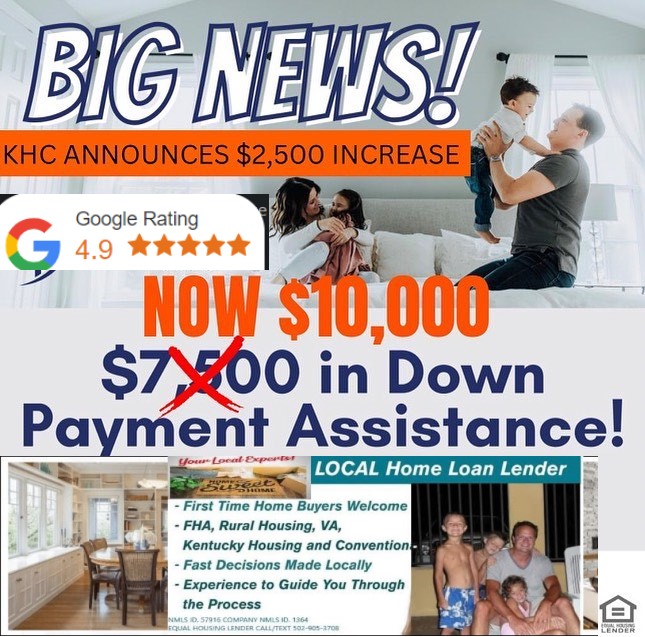Kentucky FHA Loan Requirements for 2024 to include Credit Fico Scores, Down Payment, Income and Job history
FHA
An FHA loan is a mortgage issued by federally qualified lenders and insured by the Federal Housing Administration (FHA). FHA loans are designed for low-to-moderate income borrowers who are unable to make a large down payment.
- Minimum Credit Score is 500 with at least 10% down
- Minimum Credit Score is 580 if you put less than 10% down
FHA Guidelines
- Upfront and Monthly Mortgage Insurance is required regardless of the Loan to Value
- FHA Loans are only available for financing primary residences
- Maximum Debt to Income Ratio of 50% (unless mitigating factors justify allowing a higher DTI)
Kentucky FHA Loan Requirements
The requirements for Kentucky FHA loans are set by HUD.
- Borrowers must have a steady employment history of the last two years within the same industry or line of work. Recent college graduates can use their transcripts to supplant the 2-year work history rule as long as it makes sense.
- Self-Employed will need a 2-year history of tax returns filed with IRS. They will take a 2-year average.
- FHA requires a 3.5% down payment. Can be gifted from family member or from retirement savings plan, or money saved-up. Any type of cash deposits is not allowed for down payments. No exceptions to this rule!! This is one of the biggest issues I see in FHA underwriting nowadays.
- FHA loans are for primary residence occupancy. Not rental houses.
- Borrowers must have a property appraisal from a FHA-approved appraiser.
- Borrowers’ front-end ratio (mortgage payment plus HOA fees, property taxes, mortgage insurance, homeowners’ insurance) needs to be less than 31 percent of their gross income, typically. You may be able to get approved with as high a percentage as 43 percent. If the Automated Underwriting System gives you an Approved Eligible you can go higher on the debt ratios
- Borrowers must have a minimum credit score of 580 for maximum financing with a 3.5% down payment
- Borrowers must have a minimum credit score of 500-579 for maximum LTV of 90 percent with a minimum down payment of 10 percent. Most lenders will not go below 580 to 620 score, and very few lenders will go to 580 score. It’s best to work on getting your scores up before you apply or work with a loan officer to improve them.
- 2 years removed from Chapter 7 is required with good pay history after bankruptcy
- 1 year removed from Chapter 13 is okay with an excellent pay history with the Chapter 13 plan and permission from trustee. You will need to qualify with the Chapter 13 payment along with new house payment. Again, scores will play into your loan pre-approval.
- Typically, borrowers must be three years out of foreclosure and have re-established good credit. Exceptions can be made if there were extenuating circumstances and you’ve improved your credit. If you were unable to sell your home because you had to move to a new area, this does not qualify as an exception to the three-year foreclosure guideline.
FHA
Low Down Payment which can be 100% gift from family member or Grant Program
Seller can pay closing costs-Maximum 6% of purchase price
There is maximum mortgage amount for each county. Check FHA loan limit for your county.
Non-occupant co-signers are allowed on this program.
FHA Approved Condos-Single family home-2-4 unit properties, and PUDs are eligible.
Fast automated underwriting approval available. Also, the file can be manually underwritten by a live person to get loan approval if you do not receive approval through automated underwriting system.FHA Foreclosure Program
Must be HUD Owned property or FHA Foreclosure in HUD Participating Communities
$100 Down Payment than standard FHA program
580 minimum credit score
Single family, 1-4 unit properties, HUD approved condominiums, and PUDS eligible2. Kentucky Housing Corporation Down Payment Assistance for 2024.
Kentucky Down payment assistance loans are available up to $10,000 for Mortgage
KHC recognizes that down payments, closing costs, and prepaids are stumbling blocks for many potential home buyers. We offer a special loan program to help with those. Your KHC-approved lender can help you apply.
Eligibility: Both first-time and repeat home buyers purchasing a single-family dwelling. Purchase price can be no more than $481,176. Applicant’s income must be within applicable secondary market limits in effect. If KHC’s Homebuyer Tax Credit is used, then household income must be under the Homebuyer Tax Credit income limits.
Mortgage Revenue Bond (MRB) First Mortgage Products Eligibility: Must be a first-time home buyer, unless purchasing a single-family dwelling in a targeted county. Purchase price can be no more than $481,176. Gross annual household income must be within applicable limits in effect. All non-borrowing occupants age 18 or older must disclose income and complete Non- Borrowing Occupant Form.KHC ELIGIBILITY AND CREDIT STANDARDS OVERVIEW (Not intended to be an all-inclusive list.)
Home Buyer Eligibility
•
KHC can help both first time and repeat home buyers statewide.
•
Must be a U.S. citizen or legal status to be in U.S.
•
Applicant’s income ONLY through Secondary Market.
•
Property must be the borrower’s principal residence.
•
Borrower cannot own any other residential property at time closing for all loans with MRB Funding.
•
Any Borrower that meets both the income and purchase price limit can have access to Down Payment Assistance.
Kentucky Housing Credit Standards
•
620 minimum credit score required for FHA, VA, & RHS.
•
660 minimum credit score required for Conventional.
•
Debt ratios: 40/50%
•
Collections in most cases do not need to be paid-off in full.
•
Bankruptcies and foreclosures must be discharged two to seven years.
•
Non-taxable income can be grossed-up.
Property Eligibility
•
Both new and existing property.
•
Both new & existing Manufactured Housing.
•
With RHS only new construction Manufactured housing is allowed.
•
Purchase price limit of $481,176 for Secondary Market, MRB Loans, and Tax Credit.
•
Full appraisal required on all KHC loans.
•
With Existing Property, VA is the only loan product that requires a termite inspection.
•
A termite soil treatment certificate is required on ALL new constructionRegular Down Payment Assistance Programs (DAP) Only home buyers obtaining a Kentucky Housing Corporation first mortgage are eligible for DAP funds.Interest Rate with DAP applicable.Eligible KHC Mortgages FHA, RHS, VA, HFA Preferred, & HFA Preferred Plus 80 Income EligibilitySecondary Market or Mortgage Revenue Bond Property Eligibility New and Existing PropertiesBorrower Eligibility First-time and Repeat Home Buyers Amount Up to $10,000Not required to be at maximum LTV first mortgage amount Terms 3.75% amortized over 10 years Purchase Price Limit $481,176 AUSBorrower must qualify with additional monthly payment.With AUS approval, can go up to 40/50% with all loans.Required Repairs Buyer or seller must use OWN funds to pay for repairs DAPMortgage Revenue Bonds (MRB)
- Informational Flyer
- First-time homebuyers statewide in non-targeted areas
- First-time and repeat homebuyers statewide in targeted areas
- 30-year fixed interest rate
- Principal residence ONLY
- Purchase Price Limit: $481,176
- Borrower must meet KHC’s MRB Income Limits
- Insured by the Federal Housing Administration
- 3.5 percent down payment
- KHC DAP applicable
- Upfront and monthly mortgage insurance
- Minimum credit score of 620
- Guaranteed by the Veterans Administration for qualified military veterans
- No down payment if the property appraises for the sales price or greater
- KHC DAP applicable
- Minimum credit score of 620
- No monthly mortgage insurance payments
- Guaranteed by Rural Housing Services (RHS)
- Home must be located in a rural area as defined by RHS
- No down payment if the property appraises for the sales price or greater
- KHC DAP applicable
- Upfront and monthly mortgage insurance
- Minimum credit score of 620
Secondary Market Funding Source
- First-time and repeat homebuyers statewide
- 30-year fixed interest rate
- Principal residence ONLY
- Purchase Price Limit: $481,176
- Borrower must meet KHC’s Secondary Market Income Limits
- Minimum credit score of 660
- 3 percent down payment
- Monthly mortgage insurance (charter coverage)
- KHC DAP applicable
- No minimum borrower contribution
- No reserves required
- 80 percent AMI income
- Minimum credit score of 660
- 3 percent down payment
- Monthly mortgage insurance (standard coverage)
- KHC DAP applicable
- No minimum borrower contribution
- No reserves required
- Secondary Market Income limits apply
- Insured by the Federal Housing Administration
- 3.5 percent down payment
- KHC DAP applicable
- Upfront and monthly mortgage insurance
- Minimum credit score of 620
Refinance Options (Available only through Secondary Market)
- Credit qualifying Streamline Refinance and Rate/Term Refinance
- Insured by the Federal Housing Administration
- Cash back to borrower not to exceed $500
- Upfront and monthly mortgage insurance
- Minimum credit score of 620
- Guaranteed by the Veterans Administration for qualified military veterans
- No down payment if the property appraises for the sales price or greater
- KHC DAP applicable
- Minimum credit score of 620
- No monthly mortgage insurance payments
Refinance Options (Available only through Secondary Market)
- VA IRRRL
- 620 minimum credit score
- No appraisal required
- 30-year term
- VA existing loan
- Guaranteed by Rural Housing Services (RHS)
- Home must be located in a rural area as defined by RHS
- No down payment if the property appraises for the sales price or greater
- KHC DAP applicable
- Upfront and monthly mortgage insurance
- Minimum credit score of 620
Refinance Options (Available only through Secondary Market)
- RHS Streamlined-Assist Refinance Program
- 620 minimum credit score
- No appraisal required
- Must have made timely mortgage payments for the last 12 months
- 30-year term
- RHS existing 502 guaranteed loan
Joel Lobb (NMLS#57916)
Senior Loan OfficerAmerican Mortgage Solutions, Inc.
10602 Timberwood Circle Suite 3
Louisville, KY 40223
Company ID #1364 | MB73346Text/call 502-905-3708
kentuckyloan@gmail.comIf you are an individual with disabilities who needs accommodation, or you are having difficulty using our website to apply for a loan, please contact us at 502-905-3708.
Disclaimer: No statement on this site is a commitment to make a loan. Loans are subject to borrower qualifications, including income, property evaluation, sufficient equity in the home to meet Loan-to-Value requirements, and final credit approval. Approvals are subject to underwriting guidelines, interest rates, and program guidelines and are subject to change without notice based on applicant’s eligibility and market conditions. Refinancing an existing loan may result in total finance charges being higher over the life of a loan. Reduction in payments may reflect a longer loan term. Terms of any loan may be subject to payment of points and fees by the applicant Equal Opportunity Lender. NMLS#57916
— Some products and services may not be available in all states. Credit and collateral are subject to approval. Terms and conditions apply. This is not a commitment to lend. Programs, rates, terms and conditions are subject to change without notice. The content in this marketing advertisement has not been approved, reviewed, sponsored or endorsed by any department or government agency. Rates are subject to change and are subject to borrower(s) qualification.
Kentucky FHA Loan Requirements
The requirements for Kentucky FHA loans are set by HUD.
- Borrowers must have a steady employment history of the last two years within the same industry or line of work. Recent college graduates can use their transcripts to supplant the 2 year work history rule as long as it makes sense.
- Self-Employed will need a 2 year history of tax returns filed with IRS. They will take a 2 year average.
- FHA requires a 3.5% down payment. Can be gifted from family member or from retirement savings plan, or money saved-up. Any type of cash deposits are not allowed for down payments. No exceptions to this rule!! This is one of the biggest issues I see in FHA underwriting nowadays.
- FHA loans are for primary residence occupancy. Not rental houses.
- Borrowers must have a property appraisal from a FHA-approved appraiser.
- Borrowers’ front-end ratio (mortgage payment plus HOA fees…
View original post 453 more words











